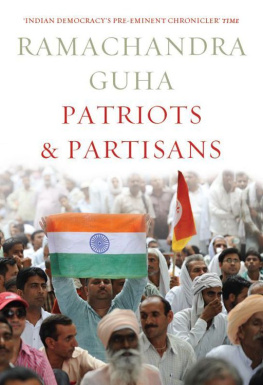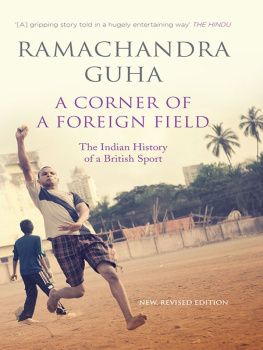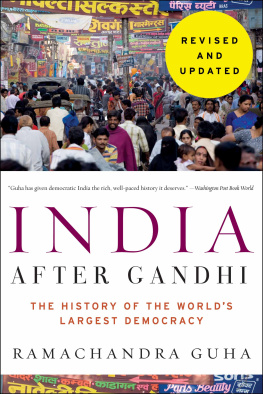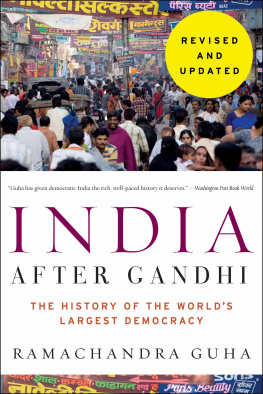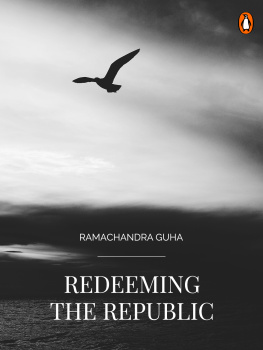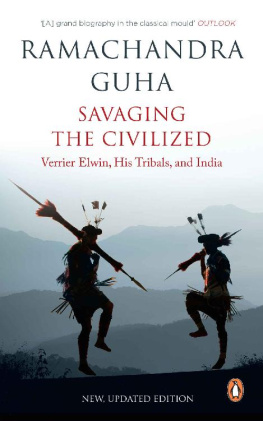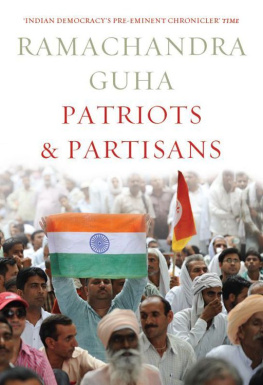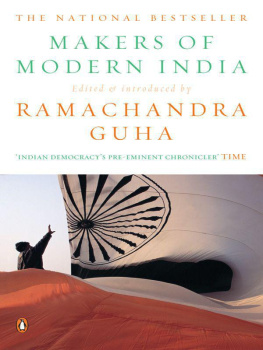B.R. Ambedkar, speaking to the Constituent Assembly
of India, 26 November 1949
Preface
The Case for Polemical Moderation
~
I
I am a person of moderate views, these sometimes expressed in extreme fashion. This makes me an anomaly, an oddity even, for polemics are normally the preserve of the right and the left. My friend and teacher Dharma Kumarwhose shadow and example hangs over many of the essays in Patriots and Partisansonce complained in print that Indian liberals were a supine lot. They did not fight their corner vigorously enough. Offering their views tentatively, hesitantly, liberals tended to be rolled over in public discourse by the more committed (in all senses) extremists of the left and right.
In the 1950s and 1960s, most Indian intellectuals and writers would have been happy to own the label liberal. The characteristic features of their brand of liberalism were four. First, they believed in reform, not revolution; not in utopian schemes for upturning or rehauling society, but in incremental social change based on patient, steady hard work. Second, they urged, and often worked for, the creation of impersonal, rule-bound institutions within the state (as in universities and law courts), and in civil society (as in cooperatives or womens groups). Third, they kept their distance from political parties and (especially) from individual politicians. Their allegiance was to the democratic ideals of the Indian Constitution, namely, a multi-party political system based on adult franchise, a secular state, a multilingual polity, equal rights for women, and special privileges for disadvantaged sections such as Dalits and tribals. It was not to any partisan rendering of these ideals. Finally, those Indian liberals practised an unselfconscious and understated patriotism. They loved this country and wished to leave India a betteror at least less discontentedplace than it was when they entered it.
In the 1970s and beyond, there was a rise of illiberal tendencies in Indian society. The Indian Constitution had always been unpalatable to Marxist-Leninists, since it did not privilege a particular political party (their own); and to Hindu radicals, since it did not privilege a particular religious faith (their own). Ever since Independence, religious extremists and left-wing revolutionaries have made repeated attempts to impose their dogmas by force. In recent decades, a third threat to democratic functioning has manifested itselfnamely, the corruption and corrosion of the constitutional centre, via the capture of public institutions, and of political parties, by individuals, families and caste groups.
Dharma Kumar had lived through the heydaythe complacent heydayof Indian liberalism. As she grew older, she saw her fellow liberals wavering in the face of these three challenges. Some writers and scholars, out of weariness or opportunism, became courtiers of the Congress party. Others, out of disgust with this sycophancy, walked into the arms of the Bharatiya Janata Party (thus implicitly, at least, endorsing its ideal of the Hindu theocratic state). A third set of intellectuals, out of guilt or foolishness, became apologists for the revolutionary Maoists gaining influence in the forests and hills of central India.
It may be because I live in Bangalore, and not Delhi, that I have been able to maintain my independence from political parties. Specific essays in this book detail my disagreements with the Congress, the Sangh Parivar, and the parliamentary Left. The Maoists and their fellow travellers dislike me tooone of this ilk, writing on the website CG Net, attacked me for my anti-left views, claiming that I had strong ties to the Congress establishment and stronger ties to the American establishment.
In truth, the only establishment that I count myself close to is that which runs Koshys Parade Caf in Bangalore. However, the fellow traveller was right in identifying me as a critic of the Maoists, whom I regard as being as great a threat to decency and democracy as the corruption of the Congress or the bigotry of the Sangh Parivar.
Whether writing of extremists of the left and right, or of opportunists and dealmakers at the Centre, I have sought to affirm my liberalism in ways that would not be considered supine. I have followed my teachers advice most faithfully in newspaper columns. And I have departed from it most radically in works of historical scholarship. When one has to state a case in a few hundred words one can, perhaps must, do so vigorously. When one has a few hundred pages to work with, it is best to let the depth of your research carry the burden of your argument.
These distinctions in tone are linked to the respective time horizons in which these genres operate. A column is written for the momentthe newspaper it is written for constitutes the next mornings rubbish. A book is written to endure; to be reador so the author hopesfor months and years after it is published. One can be opinionated, even extravagantly so, in a column; one is obliged to be more careful, and restrained, in a book.
Intermediate between the column and the book is the essay. Here, one can be both passionate and substantial; thus to allow oneself into the narrative, while stiffening it with a core of new or at least little-known facts. In five thousand words (better still, ten thousand) one can develop the contours of an argument, rather than simply state it. Its nuances and complexities can be expanded upon. Its limitations and caveats can be underlined. And yet, since this is an essay and not one long, continuous book, the personality of the writer canfor good or for illstill be allowed to exhibit itself.

